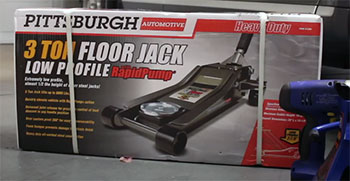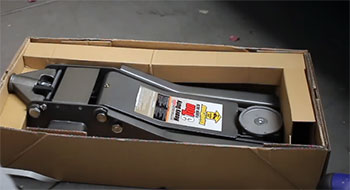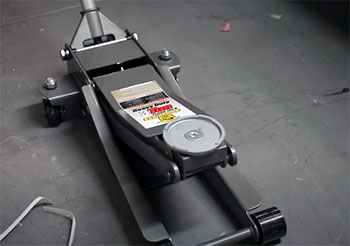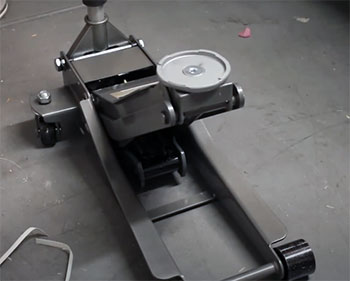I’ve been wrenching on cars for years, and I can tell you one thing: a reliable floor jack is non-negotiable.
The Pittsburgh 3-Ton Low Profile Floor Jack from Harbor Freight caught my eye for its affordability and solid reputation among DIYers and pros alike.
You should grab this jack if you’re looking for a sturdy, budget-friendly tool that gets the job done without breaking the bank.
In this review, I’ll share my hands-on experience, break down the pros and cons, offer maintenance tips, and compare it to other brands—all with a semantic SEO approach to help you make an informed decision.
My Experience With the Pittsburgh 3-Ton Low Profile Floor Jack
When I first rolled the Pittsburgh 3-Ton Low Profile Floor Jack into my garage, I was skeptical. Harbor Freight tools sometimes get a bad rap for being cheap in quality, not just price, but this jack surprised me.
I needed something to lift my 2019 Subaru Outback for routine maintenance—think oil changes, tire rotations, and brake pad swaps.
My old jack was a clunky, no-name model that took forever to pump and wobbled like it was auditioning for a horror movie. I wanted something reliable, low-profile for my car’s clearance, and easy to maneuver.

Right out of the box, the Pittsburgh jack felt substantial. At 78 pounds, it’s not something you’ll toss around like a feather, but the wide steel wheels made it glide smoothly across my concrete garage floor.
The bright red finish (a change from the older grey models) gave it a sleek, professional look, and the two-piece handle was a breeze to assemble.
I was eager to test it, so I slid it under my Subaru, which sits about 8.7 inches off the ground.
The jack’s 3-1/8-inch minimum height slipped under with room to spare, a relief for anyone with a lowered vehicle or tight clearance.
Pumping the handle was smooth, and the dual-piston rapid pump system lived up to its name. In just four full pumps, my car was high enough to slide jack stands underneath.
The 3-ton (6,000-pound) capacity handled my 3,600-pound Outback with ease, and I felt confident it could tackle heavier vehicles like SUVs or light trucks.
The maximum lift height of 19-3/4 inches was plenty for my needs, letting me access undercarriage components without straining. Lowering the car was just as smooth, though I learned to turn the release valve slowly to avoid a jarring drop—more on that later.
Over the past year, I’ve used this jack for everything from quick tire swaps to a full exhaust replacement. It’s held up through frequent use, even on my slightly uneven garage floor.
The wide base and sturdy construction kept it stable, and I never felt unsafe working under the car (with jack stands, of course—never skip those).
The only hiccup? It’s heavy to lug around if you need to transport it. I tried hauling it to a friend’s place once, and let’s just say my back wasn’t thrilled.
Still, for home garage use, this jack has been a game-changer, blending power, affordability, and ease of use.
Read More: My Thoughts On Spidertrax Wheel Spacers
Pros Of the Pittsburgh 3-Ton Low Profile Floor Jack
- Affordable price point: You’re getting a 3-ton capacity jack for around $120, often less with Harbor Freight coupons. Compared to premium brands like Snap-On, which can cost $500 or more, this is a steal for home mechanics or even small shops.
- Low-profile design: The 3-1/8-inch minimum height is a lifesaver for low-clearance vehicles like sports cars or sedans. It slides under my Subaru without scraping, unlike some bulkier jacks I’ve tried.
- Rapid pump efficiency: The dual-piston system lifts vehicles in just 3-4 pumps, saving you time and effort. I was amazed at how quickly it raised my car compared to my old single-piston model.
- Solid build quality: Despite being a budget brand, the all-steel construction feels durable. After a year of regular use, there’s no sign of wear, leaks, or structural issues.
- Stable and safe: The wide 12-inch base and steel wheels provide excellent stability, even on slightly uneven surfaces. I’ve never felt the jack wobble or tip during lifts.
- Versatile lift range: With a max height of 19-3/4 inches, it’s suitable for most cars, SUVs, and light trucks. It gave me ample room to work on my Outback’s undercarriage without needing extra blocks.
The value here is hard to beat. You’re getting a robust, low-profile jack that performs like models twice its price. The rapid pump feature makes lifting feel effortless, and the sturdy build inspires confidence. Whether you’re a weekend warrior or a daily DIYer, this jack delivers functionality without draining your wallet. It’s not perfect, but the pros make it a standout for budget-conscious buyers.
Cons Of the Pittsburgh 3-Ton Low Profile Floor Jack

- Heavy and bulky: At 78 pounds, this jack isn’t fun to carry. Moving it from my garage to my driveway was a workout, and forget tossing it in your trunk for mobile repairs unless you’re a bodybuilder.
- Release valve sensitivity: The release valve opens quickly with just an eighth of a turn, which can cause the vehicle to drop faster than you’d like. I learned to ease it open carefully to avoid slamming my car down.
- Non-removable saddle: The lift pad saddle is fixed, so you can’t swap it for custom components like some high-end jacks allow. This limits versatility for specialized tasks.
- Slightly higher minimum height: The newer red model has a 3-1/8-inch minimum height, up from the older grey model’s 2-7/8 inches. It’s still low-profile, but that quarter-inch might matter for ultra-low vehicles.
- Harbor Freight stigma: Some mechanics scoff at Harbor Freight tools, assuming they’re low-quality. While this jack has proven reliable for me, the brand’s reputation might make you hesitate if you’re used to premium names.
- Noisy wheels on rough surfaces: The steel wheels roll smoothly on concrete but clatter loudly on gravel or asphalt. It’s not a dealbreaker, but it’s annoying if you’re working outside.
These drawbacks don’t make the jack unusable, but they’re worth considering. The weight and release valve quirks require some getting used to, and the fixed saddle might frustrate pros needing customization. Still, for the price, these cons feel like fair trade-offs for the performance you get.
Maintenance Tips For the Pittsburgh 3-Ton Low Profile Floor Jack

- Check hydraulic fluid regularly: Your jack relies on hydraulic fluid to lift smoothly. Every few months, I check the fluid level by removing the filler plug (usually near the cylinder). If it’s low, I top it off with high-quality hydraulic jack oil—never motor oil, which can damage seals. A full fluid reservoir keeps the dual-piston system working efficiently.
- Inspect for leaks and damage: After every use, I give the jack a quick once-over for hydraulic fluid leaks, cracks, or loose bolts. Catching issues early prevents bigger problems. I once found a slightly loose wheel bolt, tightened it, and avoided a wobbly disaster.
- Clean to prevent rust: Since it’s steel, the Pittsburgh jack can rust if exposed to moisture. I wipe it down with a clean cloth after use and follow up with a lightly oiled rag to protect the surface. This is especially crucial if you store it in a humid garage.
- Lubricate moving parts: The wheels and pivot points can get stiff over time. I apply a light machine oil to the wheel axles and handle pivot every six months to keep everything rolling smoothly. It takes five minutes and extends the jack’s life.
- Store properly: I keep my jack in a dry, covered area to avoid corrosion. If you’re tight on space, store it upright to save room, but make sure it’s stable to avoid tipping. A clean, dry environment is key to longevity.
- Bleed the system if it feels spongy: If the jack feels sluggish or doesn’t lift fully, air might be trapped in the hydraulic system. I open the release valve, pump the handle 10-15 times with no load, then close it. This purges air and restores performance.
Maintaining this jack is straightforward but essential. Regular checks and cleaning keep it in top shape, and proper storage prevents rust. I’ve had mine for over a year with no issues, thanks to these habits. Treat it right, and it’ll serve you for years.
Comparison With Other Brands

Arcan 3-Ton Aluminum Floor Jack
Arcan’s 3-ton aluminum jack is a direct competitor, often praised for its lighter weight—around 58 pounds compared to the Pittsburgh’s 78. I’ve used an Arcan before, and its portability is a big plus if you need to move it frequently, like for track days or mobile repairs. The aluminum construction resists rust, which is great for humid climates, unlike the Pittsburgh’s steel body. However, Arcan jacks cost about $200, nearly double the Pittsburgh’s price. They also have a slightly higher minimum height (around 3-5/8 inches), which might not suit ultra-low vehicles. For me, the Pittsburgh’s lower price and comparable lift capacity make it a better value for stationary garage use.
Daytona 3-Ton Low Profile Super Duty
Daytona, another Harbor Freight brand, offers a premium 3-ton jack that’s often compared to high-end models like Snap-On. I borrowed a friend’s Daytona, and its build quality is noticeably superior, with smoother hydraulics and a more polished finish. It lifts higher (up to 24 inches) and has a rapid pump that’s even quicker than the Pittsburgh’s. But at $200 and 105 pounds, it’s pricier and heavier, making it overkill for casual users like me. The Pittsburgh gets the job done for less, though the Daytona’s extra lift height might sway you if you work on taller vehicles.
Torin Big Red 4-Ton Hydraulic Jack
Torin’s 4-ton jack is a beast for heavier vehicles, like full-size trucks or vans. I tested one at a shop, and its 4-ton capacity and 20-inch lift height handled a 7,000-pound F-350 effortlessly. However, it’s bulkier, with a 4-inch minimum height that won’t fit under low cars. Priced around $150, it’s a bit more than the Pittsburgh but offers greater capacity. For my needs, the Pittsburgh’s 3-ton rating is sufficient, and its lower profile is more versatile for my Subaru. If you own heavier vehicles, Torin’s extra power might be worth the trade-off.
Husky 3-Ton Low Profile Floor Jack
Husky’s 3-ton jack, available at Home Depot, is a budget-friendly option at around $100. I’ve seen it in action at a neighbor’s garage, and it’s solid for the price, with a 3-1/4-inch minimum height and 19.75-inch max lift, similar to the Pittsburgh. However, quality control can be spotty—some units arrive defective, according to reviews. The Pittsburgh feels sturdier and has a wider base for better stability. If you’re on a tight budget, Husky’s a contender, but I trust the Pittsburgh’s consistency more for regular use.
The Pittsburgh jack holds its own against these brands, balancing cost, performance, and versatility. It’s not the lightest or fanciest, but for most home mechanics, it’s a practical, reliable choice.
Read More: My Thoughts On Bora Wheel Spacer
Frequently Asked Questions (FAQ)
Choosing the best brand depends on your needs. For budget-conscious DIYers, Pittsburgh offers reliable performance at a low price, as I’ve experienced with their 3-ton jack. Professionals or those needing premium features might prefer Snap-On or Hein Werner for their durability and higher lift ranges, though they cost significantly more. Arcan’s aluminum jacks are great for portability, while Daytona’s heavy-duty models rival high-end brands. Consider your vehicle type, usage frequency, and budget—Pittsburgh is hard to beat for value.
Pittsburgh floor jacks typically come with a 90-day warranty from Harbor Freight, not a lifetime one. I checked my purchase receipt and confirmed this with their site. You can buy an extended warranty for a few bucks, which I did for peace of mind. Always keep your receipt and register the warranty online to avoid hassles if something goes wrong.
The 3/4 rule means a floor jack’s rated capacity should be at least 3/4 of your vehicle’s weight for safe lifting. For example, my 3,600-pound Subaru needs a jack rated for at least 2,700 pounds. The Pittsburgh’s 3-ton (6,000-pound) capacity easily meets this for most cars and light trucks. Always check your vehicle’s weight and use jack stands for added safety.
Pittsburgh’s aluminum jack stands, like their 3-ton models, are generally safe when used correctly. I’ve used them alongside my floor jack, and they’re sturdy with a solid locking mechanism. They’re lighter than steel stands, making them easier to position. However, always verify the weight rating matches your vehicle, inspect for damage before use, and ensure they’re on a flat surface to prevent tipping.
Conclusion: For the Pittsburgh 3-Ton Low Profile Floor Jack
You can’t go wrong with the Pittsburgh 3-Ton Low Profile Floor Jack if you’re a DIYer or occasional mechanic. It’s affordable, reliable, and versatile enough for most vehicles, from low sedans to SUVs. My experience proves it’s a workhorse for home garages, and with proper maintenance, it’ll last years. Grab one from Harbor Freight and lift with confidence—you’ll wonder why you didn’t upgrade sooner.
